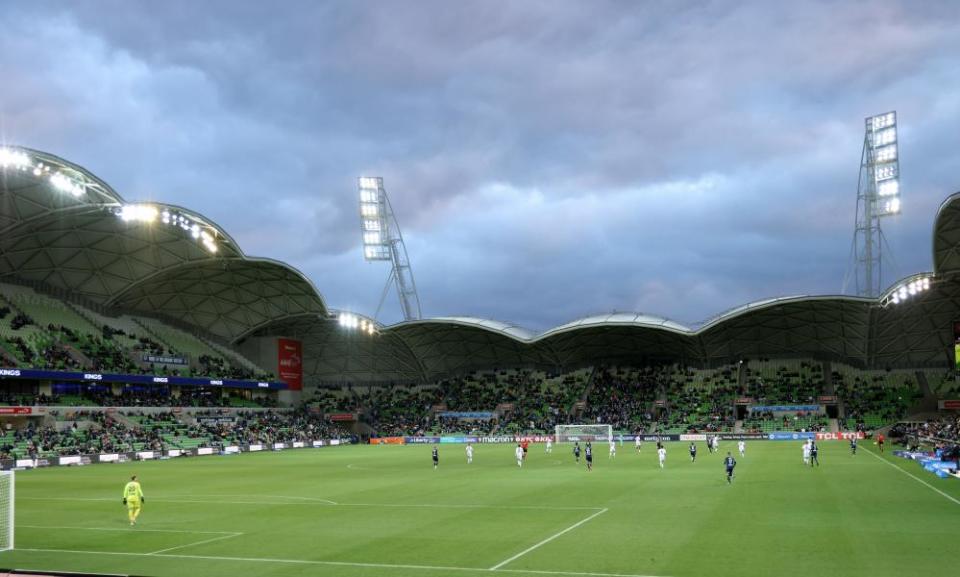Omicron nudges Australian football into familiar comfort of crisis

Australian football was supposed to be beyond this. The 2021-22 season was supposed to be when everything returned to some semblance of normality. Yet, just when the A-Leagues thought they were out, Omicron pulled them back in.
Thanks to a wave of positive tests, enforced isolations, and match postponements, Australian football has settled into the now-familiar comfort of crisis. Across the past week: three FFA Cup games, four ALM games, and one ALW fixture have fallen prey to Covid.
Related: A-League Men’s latest new dawn hints at a brighter future... once again | Emma Kemp
Though the game was eventually abandoned, that the Newcastle Jets were initially set to host Western Sydney Wanderers behind closed doors on Boxing Day carried an air of macabre nostalgia. The Jets defeated Melbourne City in front of empty stands at McDonald Jones Stadium before the season was suspended at the birth of the pandemic in early 2020.
Given the parallels, calls for another hiatus, or a return to centralised hubs, are inevitable. In such a rapidly shifting environment, it would appear to make sense to call for a time-out, even just for a week or so, to provide clarity.
Leading into the Christmas weekend at least, the possibility of hubs or a suspension to the season was not being considered by the Australian Professional Leagues. Eager to deliver both a full ALM and ALW season in their first campaign in charge, the major priority of the APL, beyond minimising any further spread of Covid amongst players and staff, remains the completion of as many games – and the rescheduling of postponed fixtures – as quickly as possible to both ensure that clubs do not experience a fixture pile-up come the end of the season, and provide more flexibility for the leagues in the event that circumstances worsen or improve.
This quest to fit games in at short notice is aided by new broadcast partner Viacom CBS proving a more adaptable partner than Fox Sports. In 2020-21, the looming conclusion of the existing broadcast deal meant that City’s coronation as ALM champions had to take place before the end of June, even with the outbreak of the Delta variant. In contrast, positioning itself as “The Home of Australian Football”, Viacom ostensibly has little choice but to do what it can to support APL, lest its brand new investment becomes a lemon less than a year in.
APL chief executive Danny Townsend told the Sydney Morning Herald there was no inclination to extend the length of the season beyond its scheduled end date of May, but the existence of this five-year broadcast deal, as well as a new multi-year collective bargaining agreement with Professional Footballers Australia, would remove two significant barriers to the leagues seeking to make adjustments should the postponements begin to pile up.
Steadfast as the APL’s intention may appear, the fragile nature of pressing on with a national sporting competition in defiance of a highly communicable virus was laid bare on Sunday when an unnamed member of Melbourne City’s fully vaccinated ALW squad, who lives in a house with a number of her teammates, returned two positive rapid antigen tests the day of her side’s win over Melbourne Victory. City were made to scramble to determine if any other asymptomatic players might also test positive, and figure out a way to prepare for the fixture in a manner that would allow for at least some form of risk minimisation.
Beyond the reality of teammate to teammate transmission, ALW presents its own unique challenges to administrators. Unlike their fully professional male counterparts, the majority of ALW players have jobs outside football, increasing their chances of contracting Covid. The first ALW player reported during this present wave, a Newcastle Jets player, tested positive after being exposed at her non-football place of employment.
Related: Melbourne wins interstate battle of ALM brands as Western Sydney’s woes continue | Emma Kemp
The A-Leagues are hardly alone in having their best-laid plans plunged into chaos. Positive cases and postponements have swept the English Premier League in recent weeks and in the face of a deluge of absences, the NFL, perhaps operating on the Trumpian assumption that fewer tests equals less Covid, has altered its regimens to drop mandatory testing for fully vaccinated and asymptomatic players and coaches. By contrast, the APL is understood to be investigating means of increasing testing.
But a vaccination or booster mandate is not yet on the table, with the APL content that with almost every player in the competition already jabbed such a policy isn’t needed. Such a stance is made easier by government policies and private companies, such as airlines, doing some of the heavy lifting. For example, Western United coach John Aloisi confirmed one of his players was unavailable for selection due to his unvaccinated status.
Inevitably, the APL will be driven by its own internal metrics and priorities when it comes to formulating plans for how its newly independent properties respond to the latest challenge. But how long any plans will last is a great unknown. Anyone who claims to know exactly what needs to happen in the coming weeks, given that just over a month ago none of us had even heard of Omicron, is doing little more than erecting a petard for themselves.

 Yahoo Sport
Yahoo Sport 





































